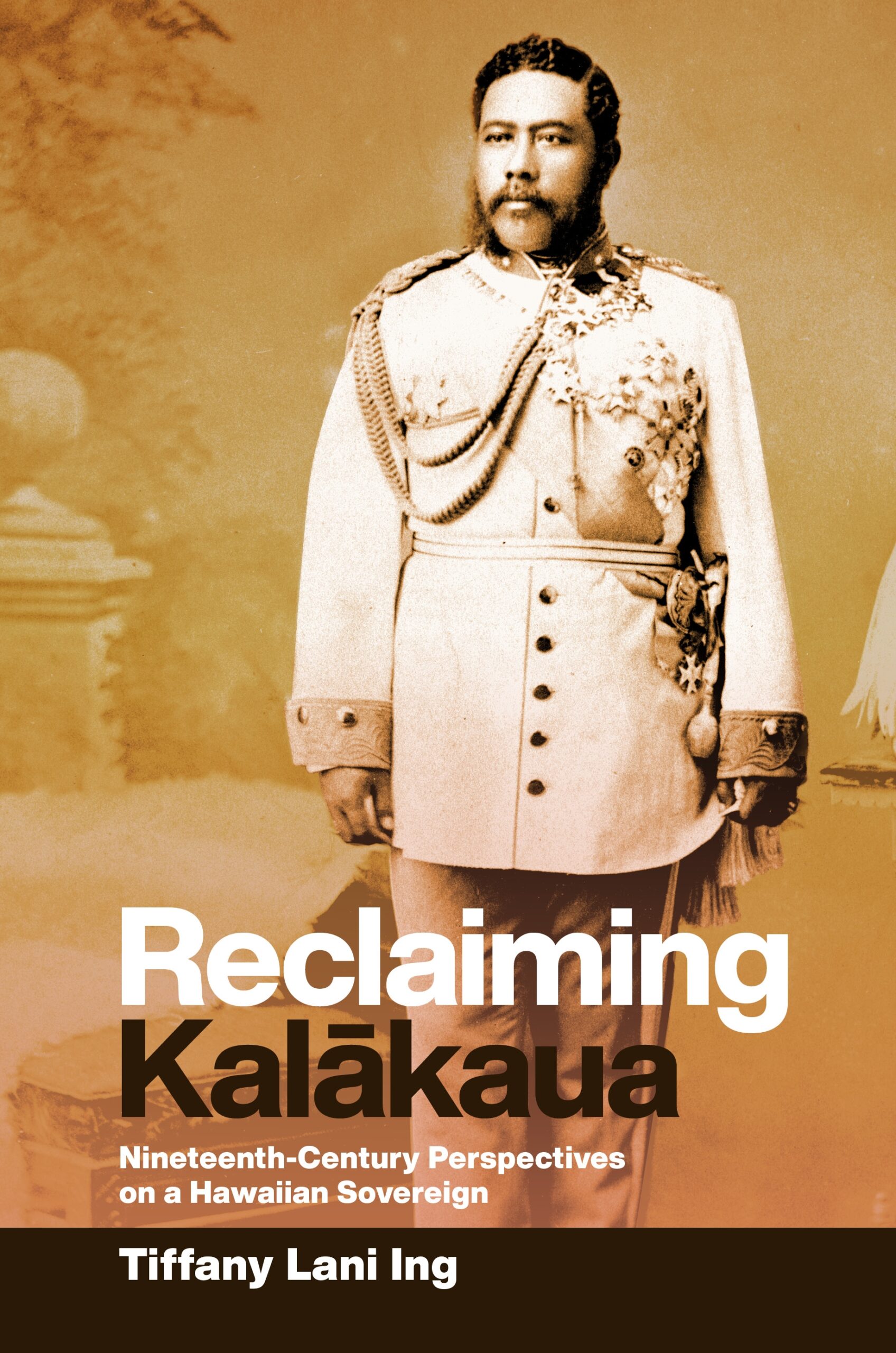Reclaiming Kalākaua: Nineteenth-Century Perspectives on a Hawaiian Sovereign
- About the Book
-
Reclaiming Kalākaua: Nineteenth-Century Perspectives on a Hawaiian Sovereign examines the American, international, and Hawaiian representations of David La‘amea Kamananakapu Mahinulani Nalaiaehuokalani Lumialani Kalākaua in English- and Hawaiian-language newspapers, books, travelogues, and other materials published during his reign as Hawai‘i’s mō‘ī (sovereign) from 1874 to 1891. Beginning with an overview of Kalākaua’s literary genealogy of misrepresentation, Tiffany Lani Ing surveys the negative, even slanderous, portraits of him that have been inherited from his enemies, who first sought to curtail his authority as mō‘ī through such acts as the 1887 Bayonet Constitution and who later tried to justify their parts in overthrowing the Hawaiian kingdom in 1893 and annexing it to the United States in 1898.
A close study of contemporary international and American newspaper accounts and other narratives about Kalākaua, many highly favorable, results in a more nuanced and wide-ranging characterization of the mō‘ī as a public figure. Most importantly, virtually none of the existing nineteenth-, twentieth-, and twenty-first-century texts about Kalākaua consults contemporary Kanaka Maoli (Native Hawaiian) sentiment for him. Offering examples drawn from hundreds of nineteenth-century Hawaiian-language newspaper articles, mele (songs), and mo‘olelo (histories, stories) about the mō‘ī, Reclaiming Kalākaua restores balance to our understanding of how he was viewed at the time—by his own people and the world. This important work shows that for those who did not have reasons for injuring or trivializing Kalākaua’s reputation as mō‘ī, he often appeared to be the antithesis of our inherited understanding. The mō‘ī struck many, and above all his own people, as an intelligent, eloquent, compassionate, and effective Hawaiian leader.
- About the Author(s)
-
Tiffany Lani Ing, Author
Tiffany Lani Ing is from Mānoa, O‘ahu. She earned her PhD in English from the University of Hawai‘i at Mānoa. Her first book, Reclaiming Kalākaua: Nineteenth-Century Perspectives on a Hawaiian Sovereign, examines reports of King Kalākaua in English- and Hawaiian-language newspapers.
- Reviews and Endorsements
-
- A welcome addition to [the] rich canon of Indigenous-centred scholarship is Tiffany Lani Ing’s Reclaiming Kālakaua: Nineteenth-Century Perspectives on a Hawaiian Sovereign. Ing masterfully counters the ʻarsenal of attacks’ levelled against Kālakaua by examining more positive representations of the mōʻī found in international publications as well as English- and Hawaiian-language newspapers printed in Honolulu. . . . Ultimately, by foregrounding the Hawaiian language and Kānaka Maoli voices, Ing has produced a more inclusive, nuanced, and reliable account of King David Kālakaua’s life, leadership, and legacy.
—Christopher Kindell, University of Chicago, The Journal of Pacific History, 56:1 (2021) - Throughout the book, Ing traces newspaper coverage from Hawai‘i and in English-language newspapers from around the world. It is a remarkable feat, one that gives the reader a sense of the visible place that Hawai‘i occupied in the nineteenth century—both in the writings of those who admired Kalākaua and the kingdom and those who scorned them. This is in itself an important accomplishment, and it rests upon a remarkable research effort. . . . Ing’s book is a major achievement, and she has written it in a way that makes it useful to the specialist while remaining approachable to general readers.
—David A. Chang, University of Minnesota, NAIS 9:1 (Spring 2022)
- A welcome addition to [the] rich canon of Indigenous-centred scholarship is Tiffany Lani Ing’s Reclaiming Kālakaua: Nineteenth-Century Perspectives on a Hawaiian Sovereign. Ing masterfully counters the ʻarsenal of attacks’ levelled against Kālakaua by examining more positive representations of the mōʻī found in international publications as well as English- and Hawaiian-language newspapers printed in Honolulu. . . . Ultimately, by foregrounding the Hawaiian language and Kānaka Maoli voices, Ing has produced a more inclusive, nuanced, and reliable account of King David Kālakaua’s life, leadership, and legacy.
- Supporting Resources
-





